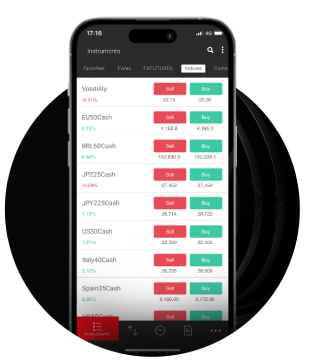Every trader has faced a losing streak that tested their psychology and confidence. Losing streaks are a normal part of every trader’s journey, but they can be mentally and emotionally draining, especially for new traders.
Sometimes traders can experience a string of losses that require specific skills to recover from. It is important to learn how to manage these losses to become a successful trader. This article will look at some of the ways you can recover from losing trades and continue growing your account.
Step away from trading temporarily
The first and most important step in trading psychology is to stop trading for a while. This might seem obvious, but it’s often the hardest advice to follow. If you’re losing regardless of whether you’re opening long or short positions, it’s time to pause. The market’s volatility isn’t always to blame – this break gives you time to reflect on what’s really going on.
However, taking a pause needs willpower. It’s not enough to just turn off your computer – you might want to turn it back on after ten minutes. So do something different, like going for a walk outside.
Set clear daily loss limits
Restrictions can be based on trading frequency and risk tolerance. For example, make it a rule to stop trading for the day when your account drops by 3%. This will keep you from making decisions based on your emotions and protect your trading capital, especially important if you’re trading with a prop firm.
Leverage your backtesting data
Some trading strategies will naturally incur small consecutive losses before making a larger winning trade that recovers previous setbacks. Analyse your strategy’s historical patterns, average loss sequences, and expected drawdown periods.
If your current trading results differ significantly from these historical patterns, it’s time to apply trading psychology and reassess your approach. Remember, success doesn’t come from guessing—it comes from precision, discipline, and consistently following your own rules.
Analyse your trades over the time period
Take some time to think about the current losing streak and how it compares to other times you’ve traded. Watch out for any changes or patterns that may show up.
- Fundamental factors. Look for what caused your winning streaks – and what triggered your losses.
- Indicators used. Check out the indicators that were used in both cases. If you used the same indicators for both winning and losing trades, look into what went wrong.
- Stop losses. Take another look at your stop-loss levels. Were they too tight, or did you move them too late?

Identify and Correct Trading Psychology Issues
Find the problem areas
It’s important to identify the areas causing difficulties in your trading. Focus on the trading psychology behind your actions: What’s bothering you? What feels off or frustrating? Sometimes, your intuition can offer valuable insights into what needs to change.
Unprofitable trading system
The market may have become more volatile, so your current indicator settings may not be effective. This could result in a non-profitable system.
The Psychology Behind Emotional Decision-Making
Emotions can cause you to stray from the rules outlined in your trading plan.
Lack of a trading system
This is a critical mistake. Having a strategy isn’t enough – a complete trading system should outline how you respond in unexpected market situations.
Be mindful of wide stop losses, excessive leverage that amplifies losses, or impulsive trades that don’t align with your established setups. In trading psychology, recognising these patterns is crucial—identify each issue clearly and address it before it escalates.
The Psychology of Developing a Corrective Plan
Once you’ve completed your analysis and identified the core issues, trading psychology becomes key to your next steps. Avoid returning to your previous trading volumes immediately. Instead, test your adjusted strategy with minimal risk. At this stage, profitability isn’t the priority—the goal is to confirm that your strategy is effective and stable.

Open trades with minimum lot sizes
Use leverage strategically to manage your exposure, margin, and overall risk.
Implement minimal stops
This approach helps reduce overall risk and reinforces sound trading psychology. When setting your stop-loss levels, keep them balanced—neither too tight nor too far—so they’re not constantly triggered by normal market movements. Analyse the average volatility of your chosen asset and use it as a practical guide for placing effective stop-loss limits.
Don’t rush into making too many trades
Prioritise the quality of trades over quantity. It’s more important to make well-thought-out decisions than placing numerous trades.
The Psychology of Sticking to Your Plan
Following your trading plan is a core principle of trading psychology. It builds self-discipline and prevents you from taking on more risk than you can manage. Once you trust your plan, you’ll have the confidence to stick with it—even during losing streaks. Always remember the golden rule: plan your trade and trade your plan.
Focus on the psychological side
When you trade, it’s not just about charts and numbers – your mindset is also very important. Keeping a positive outlook can make all the difference when things get tough. You gain confidence through experience and trusting your own process. There’ll always be problems, but try to think of them as part of the learning process. Stay grounded, stay optimistic, and most importantly, keep going.
Avoid external influences
Stay away from forums and social media platforms like Instagram that can distort your trading psychology and influence your judgment. You’re the one executing, so trust your own analysis. It’s easy to get distracted by others’ results, but that often fuels FOMO and undermines your confidence.
The Psychology of Developing a Positive Way of Thinking
Keep telling yourself that you can succeed. It can help you feel more confident if you talk to yourself in a simple, positive way.
Take a break
Recovery is the first step of staying sharp. You can get your focus and energy back by going for a walk outside or just taking a few quiet minutes to breathe.

The Psychology of Managing Your Energy Levels
A little alertness is good, but too much – like when you’ve had too many cups of coffee – can make you feel shaky or anxious. Tune in to how your body feels and find a pace that keeps you steady when you trade.
Conclusão
Losing doesn’t mean failure—it’s part of trading psychology and a step toward understanding what doesn’t work yet. Many traders struggle because they quit too soon or repeat the same mistakes. Those who succeed are patient, disciplined, and committed to learning from every experience.
Don’t let losses get to you. Treat them as temporary setbacks and use them to improve your strategy. Avoid falling into negativity; successful traders keep a positive mindset and see challenges as opportunities to get better. In the end, perseverance and self-belief are what separate long-term winners from those who quit too early.
Isenção de responsabilidade: Esta informação não é considerada como aconselhamento ou recomendação ao investimento, mas apenas como comunicação de marketing. O IronFX não é responsável por quaisquer dados ou pela informação fornecida por terceiros aqui mencionados, ou com links diretos, nesta comunicação.
















